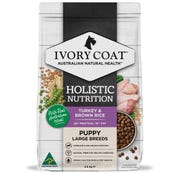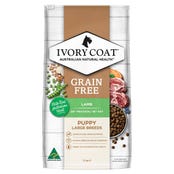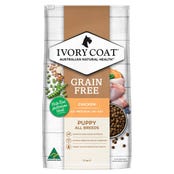Bringing home a new furry family member is an exciting time! However, it comes with plenty of important decisions around their lifestyle and wellbeing. Curating a diet that gives them the best healthy start to life is one of the most important considerations.
Puppies grow fast, so proper nutrition and a balanced diet is important for building strong bones, teeth, adding muscle and supplying all the energy needed for play. When it comes to feeding your new fur friend, there are plenty of options out there. The best food for a puppy will vary depending on their needs. However, how do you find the right fit? We’ll take you through everything you need to know about feeding a puppy.
What to feed puppies
As a general rule, puppy dog food is designed for the nutritional needs of a young, growing dog. Puppy food tends to be higher in protein and is packed full of good things, like vitamins, minerals and fats.
Many vets will recommend puppy-specific diets. There are also options for breed-formulated food. For example, large-breed formulas can help bigger pups grow at a gradual rate to help develop strong joints and bones. Small-breed specific food on the other hand provides the right nutrition in small, bite-sized amounts that will help meet a smaller puppy’s metabolic needs.
Puppy food options
- Dry food: this is a convenient option for pet parents. Dry puppy food comes in a range of sizes and options. Make sure to opt for a nutritionally complete diet balanced with high-quality ingredients.
- Wet food: puppy wet food generally comes in pouches, trays and tins. They’re great for increasing your puppy's water intake.
- Fresh and frozen food: this is often a mix of meats and raw ingredients, like vegetables, eggs or yoghurt. Find out more about fresh and frozen foods here.
- Treats: great for training and rewarding good behaviour, treats are always handy to have around when you bring your puppy home!
Puppy milk
Puppies will naturally wean from their mothers after 12 weeks of age, which means they don’t need to be fed milk. If your pup is younger than 12 weeks, then you will want to invest in good quality puppy milk. We recommend Di-Vetelact Milk Powder which is a great milk replacement for orphaned and early weaned pets. Cow’s milk does not agree with pups, and can cause nasty reactions like vomiting and diarrhoea.
What is the best puppy food?
Puppy food comes in different varieties to suit your puppy’s age, breed and activity level. Your puppies need extra nutrients to help fuel their growth. They're growing rapidly, with their bodies working hard to develop and build bone and muscle.
Look for puppy-specific food packed full with goodness like:
- High energy/calories to help fuel their rapid growth.
- High protein to help build muscles.
- Fatty acids to support brain and vision development.
- Essential vitamins and minerals to help fuel growth.
- Antioxidants like Vitamin E and C to help support the immune system.
Should you go for wet or dry?
Wet and dry doesn't have to be a one-or-the-other option. Keep in mind that the best dry puppy food or wet favourite for your pup will vary depending on the breed. Mixing these two together can give your puppy the best of both worlds, and provide them with the benefits of both diets. Remember not to overfeed your puppy and balance their mix of wet and dry.
Puppy Feeding Guide
| AGE | TOY/SMALL BREED | MEDIUM BREED | LARGE BREED |
|
8 Weeks |
4 times per day | 3 times per day | 3 times per day |
| 12 Weeks | 3 times per day | 3 times per day | 2 times per day |
| 16 Weeks | 3 times per day | 2 times per day | 2 times per day |
| 6 Months | 2 times per day | 2 times per day | 2 times per day |
| *Switch to adult food | 7-12 months | 12-16 months | 16-48months |
*Always make sure to consult with your vet before you change your dog's diet.
What kind of puppy treats should you give?
As a puppy parent, you might find yourself guilty of sneaking them some treats every now and then. Keep in mind it's best to limit the treats you give. Puppies need so many nutrients to grow, so their diet needs to be carefully balanced to provide them with the best nutrition.
All treats, whether chicken or lamb, should be offered in small amounts. Keep in mind what the meat is cooked in – avoid sauces or other toxic ingredients that can make your pup sick.
Look for dental treats or chews that can help promote healthy teeth and provide oral care.
Remember to not overfeed your pup! Try and balance their meals with the treats that you give them.
FAQ:
When to switch puppy to dog food?
The timing of adult dog food can depend on their breed, the diet they're on and how quickly they're growing. You might find your small breed finishes growing by 12 months, whereas a large breed can continue growing until 18 months.
As a general rule of thumb, once puppies have reached 90% of their expected adult weight, they should switch to an adult diet. If you have any questions about changing their diet, always talk to your vet.
How much should I feed my puppy?
Puppies grow fast, so they’ll usually need to eat a little more frequently than an adult dog. However, this all comes down to their breed – a Labrador will need more than a Jack Russel. For specific feeding instructions, always review the back of the food packet or consult with your vet.
How much wet food to feed a puppy?
If you feed your dog a mix of wet and dry, you will need to calculate a balanced diet. Always refer to the back of the food pack to find out the best feeding portions for your pup.
























